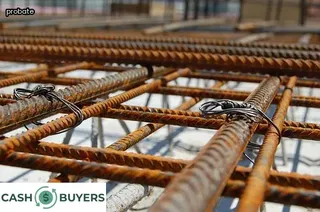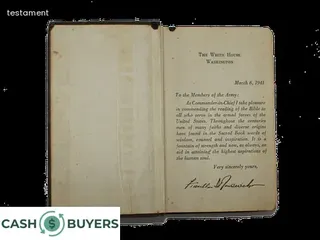The Illinois Probate Act is a set of laws that govern the process of transferring property after someone dies. It covers every aspect of probate real estate, from determining the validity of a will to identifying and notifying heirs.
It also outlines how debts should be paid off and how estate taxes should be handled. The act provides for an orderly way to divide up assets among heirs, as well as setting limits on fees that can be charged for handling the probate process.
It also defines who is eligible to serve as an executor or administrator of the estate and what responsibilities they must fulfill in order to properly close out the estate. Even if a will isn't present, there are procedures outlined in the Illinois Probate Act that explain how to distribute assets according to state law.
Knowing this information can help you unlock the secrets of probate real estate listings in Illinois, ensuring that you get the best possible deal when buying or selling a home.

In Illinois, probate is a required legal process that must be completed before a deceased person’s estate can be distributed according to their will or the applicable state law. During this process, the court will appoint an executor to identify and manage all of the assets of the deceased's estate, including any real estate holdings they may have owned.
The executor must also identify and contact any creditors of the deceased and settle any outstanding debts. After all debts are paid and assets distributed, the probate process is complete.
Unlocking the secrets of probate real estate listings in Illinois requires a thorough understanding of this legal process and its requirements. By researching current laws and consulting with an attorney familiar with probate proceedings, those interested in purchasing property through a probate listing can learn more about what is involved in such transactions.
The process of unlocking the secrets of probate real estate listings in Illinois can be an overwhelming task for many. One key element to consider when navigating these listings is the small estate affidavit.
This document is used to simplify the probate process when a decedent’s estate does not exceed a certain dollar amount and there is no will. The affidavit must be filed with the county court clerk before any asset is distributed, and all beneficiaries must sign it, as well as any other party with an interest in the estate.
It’s important to understand that only certain assets are included in this simplified process; real estate, vehicles, and other property may still require full probate court proceedings despite the existence of a small estate affidavit. As such, it’s important to research applicable laws in your area regarding how these affidavits work before deciding whether or not you should use one when dealing with probate real estate listings in Illinois.

The formal probate process in Illinois can be a complex and lengthy procedure, but understanding the steps involved is key to unlocking the secrets of probate real estate listings. It is important to note that while there are similarities between states, each state has its own unique laws and regulations.
In Illinois, the probate process begins with the filing of a petition in court by an executor or administrator. From there, the court will appoint an executor or administrator to manage the deceased's estate.
The next step will be for the executor or administrator to collect all relevant documents such as deeds, mortgages, and other financial records pertaining to the deceased's assets. Once all documents are collected and reviewed, creditors must be notified of any claims against the estate so that they can be paid out before any funds can be distributed to heirs.
Depending on the complexity of the case and amount of assets involved, it may take several months for these proceedings to be completed in order for heirs to receive their distributions from the estate. It is important for those seeking probate real estate listings in Illinois to understand this process in order to make informed decisions about investments.
Initiating the probate process for real estate listings in Illinois can seem daunting, but with the right knowledge and resources it can be a simple process. Before beginning, it is important to understand what exactly probate is and how it applies to real estate.
Probate is a court-supervised legal process that validates a deceased person’s last will and testament, identifies the rightful heirs of the estate and distributes the assets accordingly. In some cases, those assets may include real estate properties that must go through the probate process in order to be sold or transferred to heirs.
As part of this process, an executor of the estate must file certain forms with the court and potentially pay taxes before any property can be transferred out of probate. Knowing which documents are needed and understanding state law requirements are essential when looking to unlock the secrets of probate real estate listings in Illinois.
An experienced attorney specializing in Illinois real estate law can provide guidance on how best to navigate these waters and ensure all legal matters are taken care of properly throughout the entire process.

When assessing assets and debts of an estate in Illinois, it is important to consider the probate real estate listings in order to determine the total value of the estate. Probate real estate listings typically provide information regarding property titles and other legal documents that can help identify any assets or debts that must be accounted for.
It is essential to obtain a complete list of all assets and liabilities, as this will allow for a more accurate assessment. Additionally, if there are any liens on the property, these must be taken into consideration when evaluating the value of an estate.
The probate court will often appoint an Executor who will be responsible for ensuring that all debts are paid prior to distributing any funds from the estate. This process can be complex and time consuming but obtaining a comprehensive understanding of all assets and liabilities is critical for properly assessing an estate in Illinois.
When it comes to estate planning, probate real estate listings in Illinois can offer investors a great opportunity. However, understanding the tax implications of such investments is essential for success.
Illinois requires all estate taxes to be paid out of the deceased’s estate before any distribution is made to beneficiaries. This means that investors must plan ahead and understand the potential tax implications before they make a purchase.
Additionally, investors should seek professional advice when necessary to ensure they are following all applicable laws and regulations. In some cases, property held in joint tenancy or as tenants in common may be exempt from some taxes, so it's important to know what options are available and how they affect your investment.
Finally, investors should also consider capital gains taxes on any profits made during the sale of their probate real estate listing in Illinois. Understanding these tax considerations can help you make smarter decisions when investing in probate real estate listings in Illinois.

When closing out the estate after probate in Illinois, it's important to be aware of the various procedures and processes that need to be completed in order to successfully transfer the real estate property. This includes determining who is responsible for paying any outstanding debts and taxes, filing final papers with the court, and submitting a final accounting report.
Additionally, all parties involved should be up-to-date on any applicable laws or regulations related to probate real estate listings in Illinois. To ensure everything goes as smoothly as possible, it's best to work with a qualified real estate attorney who can help guide you through each step of the process and answer any questions you may have.
Finally, don't forget to take care of all necessary paperwork such as title transfers and deed changes so that everyone involved is aware of their rights and responsibilities regarding the property.
When dealing with probate real estate listings in Illinois, the pre-court steps involved in probate proceedings must be followed to unlock their secrets. The first step is to identify the assets of the deceased, which can include real estate, bank accounts, investments, and other tangible property.
The next step is to determine who will be responsible for settling the deceased's estate. This usually involves appointing a personal representative or executor of the estate.
Once a personal representative has been appointed they can begin the process of collecting debts owed to the deceased, paying off creditors and distributing assets to beneficiaries as outlined by a will or state law. Before any funds are distributed, however, taxes must be paid on any income earned by the estate during this process.
After these steps have been completed and all debts have been settled, probate real estate listings can then be unlocked for potential buyers and investors in Illinois.

If you are interested in unlocking the secrets of probate real estate listings in Illinois, understanding the process of opening a formal probate estate is essential. Probate is the legal process used to distribute a deceased person's assets to their beneficiaries according to their will or state law.
In Illinois, probate estates must be opened before any real estate property can be sold. The process begins with filing a petition for admission of the will and for letters testamentary (or letters of office) with the local court.
After filing, notice must be given to all interested parties and then an executor or administrator must be appointed by the court to oversee the estate's finances and assets. Once appointed, they will have authority over all aspects of settling the estate including selling any real estate that may have been left behind.
It's important to remember that each case is unique and there may be unusual circumstances that require additional steps or paperwork when opening a formal probate estate in Illinois.
When it comes to unlocking the secrets of probate real estate listings in Illinois, there are several key considerations for executors and beneficiaries that should be taken into account. It is essential to understand the process of probate, including the legal documents required, the timeline for completion, and any potential tax implications.
Additionally, executors and beneficiaries need to consider how their responsibilities may differ when dealing with a probate listing. It is important to be aware of lienholders and creditors, as well as any property liens that could impact the sale or transfer of a property.
Furthermore, executors must be sure to review all offers carefully before making a decision on behalf of an estate. Lastly, it is critical to understand the various closing costs that may apply and ensure they are included in the final agreement.
By thoroughly analyzing these considerations, executors and beneficiaries can unlock the secrets of probate real estate listings in Illinois with confidence.

Administering a decedent's estate and possession of real property in Illinois requires understanding the process of probate. Probate is the legal process by which a will is validated and assets are distributed to heirs according to state law.
In Illinois, probate real estate listings provide helpful insight into how property is owned and transferred upon death. Knowing the basics of these listings can help you understand what’s involved in administering a decedent’s estate and taking possession of real property.
It’s important to note that probate proceedings may vary from county to county, so it’s best to consult an attorney familiar with Illinois law before making any decisions regarding estate administration or real property possession. As far as probate real estate listings go, they are typically filed with the local court clerk or recorder’s office and include information on who has been appointed executor of the estate, who stands to inherit the deceased person's property, whether there are any outstanding debts or liens against the deceased person's property, and any other pertinent information related to the transfer of ownership or possession.
Knowing this information can help you navigate the complex issue of administering a decedent's estate and taking possession of real property in Illinois.
Filing a will to probate in Illinois can be a complicated and confusing process, but understanding the process is essential when it comes to unlocking the secrets of probate real estate listings. The first step is to file a petition with the court in order to open an estate.
This requires providing the court with proof of death, such as a death certificate or signed affidavit from a doctor or medical examiner, as well as other documents like the will itself. Once the petition has been filed and accepted by the court, an executor will be appointed to manage the deceased's assets.
This person must then take inventory of all remaining assets and debts, publish notices of transfer or sale, and oversee any necessary legal proceedings involving creditors or heirs. Additionally, they must pay off any taxes due on property inherited by heirs or beneficiaries before distributing those assets according to the terms of the will.
Throughout this process, it is important for executors to keep careful records and remain organized in order to avoid costly delays or mistakes that can have serious consequences for heirs down the line.

Establishing creditors' rights during probate is an important part of understanding and taking advantage of probate real estate listings in Illinois. Creditors must be given notice of the probate proceedings, and their claims must be formally established through the court system.
The Illinois Probate Act defines which debts are payable from a decedent's estate, which creditors have priority to receive payment, and how to pay those creditors. Additionally, creditors must prove the validity of their claim to the court within a specified period of time.
To protect against any potential disputes, it is important that all parties involved understand the process of establishing creditors' rights during probate proceedings. This includes having an understanding of what information needs to be provided to prove a creditor's claim, as well as properly filing documents with the court in a timely manner.
Finally, it is also important for those involved in probate real estate listings in Illinois to stay informed on any changes made to state laws regarding creditor's rights, since these laws can vary depending on each individual case.
An executor or administrator of a probate real estate listing in Illinois is a vital role that requires understanding and knowledge of the legal process. This individual is responsible for managing the estate of the deceased, including identifying and appraising assets, collecting debts owed to the estate, paying taxes and other obligations, and distributing assets according to court orders or instructions provided in the decedent's will.
The executor/administrator must ensure that all duties are performed correctly and in compliance with Illinois probate law. They must also be familiar with filing deadlines, financial responsibilities, asset distribution requirements, and other legal matters related to the probate process.
To properly fulfill their role as an executor/administrator of a probate real estate listing in Illinois, it is important to understand how they can best help protect both the interests of the deceased as well as those of their beneficiaries.

Navigating through complex asset distribution laws can be a daunting task for those dealing with probate real estate listings in Illinois. Knowing the ins and outs of the process can make it easier to understand how assets are divided among heirs, beneficiaries and creditors.
The first step is determining whether or not the case falls under testate or intestate law. Testate cases involve a will that outlines who gets what, while intestate cases involve an individual who has died without leaving a will.
It's important to understand which rules apply to your situation, as they dictate what happens to the deceased's property. Once this is established, next steps may include identifying all assets, settling any debts and liabilities, distributing remaining funds per instructions in the will (if applicable) and filing final tax returns.
In addition to understanding the legalities involved with probate real estate listings in Illinois, it's important to know who is responsible for handling the process from start to finish. Typically this includes an executor of the estate appointed by the court or a trust company designated by family members or other beneficiaries.
They are responsible for making sure all necessary documents are filed correctly and in a timely manner. By familiarizing yourself with these laws and processes you'll be better equipped to handle probate real estate listings in Illinois with confidence.
When it comes to unlocking the secrets of probate real estate listings in Illinois, a comparative analysis can help you understand the differences between summary and supervised administration. Summary administration is a simplified process that dispenses with some of the paperwork and court hearings associated with supervised administration.
This type of arrangement is often used when the estate is valued at less than $100,000 or when all beneficiaries agree on how to distribute assets. Supervised administration, on the other hand, requires a court-appointed representative who oversees asset distribution and ensures that all heirs receive their rightful inheritance.
This type of management also involves filing additional paperwork with the court and may require multiple hearings before assets are distributed. Ultimately, both summary and supervised administration have their pros and cons depending on your individual probate situation in Illinois, so understanding these differences is essential for unlocking the secrets of estate planning in this state.

Exploring alternative dispute resolution during probate proceedings in Illinois can prove to be a daunting task for both parties involved. However, the potential rewards of unlocking the secrets of probate real estate listings can be well worth the effort.
The probate process is a legal process that takes place when an individual passes away and their assets are distributed among their heirs. During this process, disputes may arise between family members over the ownership or use of assets.
Alternative Dispute Resolution (ADR) provides an opportunity for parties to come together and resolve their differences without taking the case to court. This could include mediation, arbitration, or even negotiation between parties.
Understanding how ADR works in probate cases can help families avoid costly litigation while still ensuring that they receive the assets they are entitled to under the law. By utilizing ADR during a probate case, families can save time and money while still achieving a fair outcome for all involved.
Additionally, understanding what types of assets are included in a probate estate listing can help families determine which assets should be handled through ADR and which should go through formal litigation processes. Understanding these nuances of Illinois Probate Law is key to settling disputes successfully and quickly without incurring additional costs or delays.
When dealing with probate real estate listings in Illinois, it is important to understand the legal process and how it can affect your interests as a beneficiary. Knowing what you are entitled to and the rights you have as a beneficiary is essential for protecting yourself in these transactions.
It is also important to be aware of all relevant documents, such as wills and trusts, so that you can ensure that your interests are represented properly. Additionally, it is beneficial to be familiar with the laws of Illinois pertaining to probate estate transactions, including applicable taxes and fees.
Lastly, having an experienced attorney on your side who specializes in probate real estate transactions will help you navigate through the complexities of these matters and ensure that your interests as a beneficiary are protected.
Yes, a house does need to go through probate in Illinois. The process of unlocking the secrets of probate real estate listings can be complex and time consuming.
Probate is a legal process that must be followed in order for an individual’s assets to be transferred after death. In Illinois, a will must be filed for probate in the county where the deceased person resided at the time of death.
The court then appoints an executor to manage the estate, including any real estate owned by the decedent. It is this executor who holds the key to unlocking probate real estate listings in Illinois and making them available for sale.
In order to access these listings, one must contact the executor or their attorney directly and request a copy of any applicable documents related to the sale of the property. By doing so, buyers can gain access to valuable information about properties that may not have been publicly advertised and may otherwise remain hidden from view.

Yes, a house can be sold while in probate in Illinois. The process of selling a home during probate involves unlocking the secrets of probate real estate listings in the state.
It is important to note that probate real estate listings are not as easily accessible as other types of real estate listings. Potential buyers must understand the process and how to navigate the complicated paperwork associated with it.
In some cases, there may be restrictions placed on the sale, such as having to obtain permission from an executor or court before proceeding with a sale. Additionally, an attorney specializing in real estate law may need to be consulted in order to ensure that all legal requirements are met.
Ultimately, it is possible to sell a house while in probate in Illinois by understanding and following the applicable laws and regulations.
In Illinois, probate is the legal process of validating a deceased person's will and distributing their assets to heirs according to state law. It can involve court proceedings that determine a decedent’s estate, including any real estate listings.
Probate also includes collecting and appraising the deceased person's property, paying debts and taxes, and distributing remaining assets among the beneficiaries of the estate. In addition to managing a decedent's real estate holdings, the probate process may involve determining entitlement to inheritance, resolving creditor claims against an estate or trust, paying taxes due on behalf of an estate or trust, administering trust funds and accounts belonging to minors or other incapacitated persons, appointing guardians for minor children, and issuing letters testamentary or letters of administration.
Understanding the probate process in Illinois can help ensure that you are aware of all your options when it comes to unlocking the secrets of probate real estate listings in Illinois.
No, not all wills have to go through probate in Illinois. Probate is a court-supervised process used to authenticate and legally execute the wishes of a deceased person's will.
In Illinois, certain small estates are exempt from the probate process and the assets can be distributed without court supervision. For example, if the total value of an estate falls below $100,000, then it may not need to go through probate.
Additionally, if a person dies with only real estate assets that are titled solely in their name and worth less than $100,000, then those assets do not have to go through probate either. Therefore, unlocking the secrets of probate real estate listings in Illinois is key for understanding how the state's laws apply to real estate assets held by a deceased person.